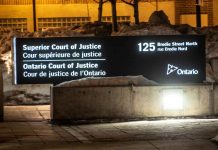There was no justice for Colten Boushie during the trial of Gerald Stanley in early 2018.
A Saskatchewan jury found Stanley not guilty of second-degree murder or manslaughter, after a gun he was holding “just went off” and killed the 22-year-old Cree man during a 2016 encounter on Stanley’s farm.
There was also no justice for Boushie’s family, after they demanded an RCMP internal probe into allegations of inappropriate, illegitimate and violent conduct of officers during the investigation.
As the family declared, mere hours after Boushie was shot, officers aggressively surrounded the home of his mother, Debbie Baptiste, and searched the residence without consent (claiming they were looking for a witness).
Informing Baptiste her son was dead and watching her fall to the floor upset, officers told her to “get it together” and asked if she had been drinking (one even smelled her breath).
Minutes later, an officer questioned her story about preparing dinner for her son by checking a microwave to see if she was lying.
To add insult to injury, officers later interrupted Boushie’s wake to “inform” the family on the investigation.
Regardless of this, the RCMP’s self-probe in 2018 cleared all officers of wrongdoing.
There was also no justice when the Saskatchewan Ministry of Justice issued a statement in 2020 stating further investigation into Boushie’s death and the conduct of officers is unnecessary, “as the conditions for an inquest have been fulfilled by the criminal trial and there is nothing further to establish in this case.”
Finally, on Monday — nearly five years after Boushie was killed — justice emerged.
In a damning report by the Civilian Review and Complaints Commission, the independent body tasked with investigating incidents involving the RCMP, it found the Mounties mishandled the investigation, likely influenced the case, and racially discriminated against the Boushie family.
The report states officers failed to obtain proper search warrants and mishandled evidence, leading the commission to state: “It is not known, and will never be known, what difference this evidence, as well as any other evidence lost… could have had on the outcome of the case.”
The report also condemned the RCMP characterizations of Boushie as a thief in news releases — when there was no evidence he participated in any illegal activities. This left the public, and potential jurors, with “the impression that Mr. Boushie’s killing was justified or that his death was ‘deserved.’”
The commission’s most damning findings were that officers openly discriminated against Boushie’s family. The CRCC “found that the evidence supported all of the family’s allegations” and pointed out further dehumanization occurred when the family had to wait “an unnecessarily long time” for responses to their allegations.
Finally, the CRCC also expressed “serious concerns” the RCMP-led internal investigation interfered with its work.
It uncovered that police destroyed recordings and transcripts of officer conduct during the case while the CRCC was performing its investigation and the RCMP knew a civil case was being initiated by the Boushie family against Stanley.
The report expressed “disappointment and frustration” at RCMP decisions — which may be the understatement of the year.
Systemic racism within the national police force is unsurprising. RCMP Commissioner Brenda Lucki has (begrudgingly) admitted it exists. She even accepted all findings in the CRCC report (except the one involving officers surrounding the Baptiste home).
What’s even less surprising is institutions within the RCMP rejecting the CRCC report.
The National Police Federation, the union representing more than 20,000 RCMP members, condemned Lucki and the findings.
In a statement, the NPF questioned the expertise of the civilian-led CRCC to handle police matters, allegations of discrimination, and refused to accept concerns of professionalism and dedication.
Cops covering up for the racism of cops is unsurprising.
What is surprising though is the CRCC is talking about racism in policing. For years, the commission has been criticized as weak, status quo, and lacking willpower.
The only conclusion is the evidence in this case is simply too overpowering, true, and undeniable.
This means, of course, the evidence, jury, and verdict in the Stanley case is illegitimate — but it also means something far bigger.
Justice for Indigenous lives is almost impossible to find, takes years to achieve, and thousands of hours of work.
In fact, it takes circumventing an entire national police force to do it.
This isn’t about instituting “cultural awareness training,” making a few firings or recommendations, or asking politicians for opinions.
This is about seeing Indigenous Peoples as human beings.
People who deserve justice.
 Niigaan Sinclair
Niigaan Sinclair
Originally appeared in the Winnipeg Free Press in March 2021. Republished with the permission of the author.
The views, opinions, and positions expressed by all columnists and contributors are the author’s alone. They do not inherently or expressly reflect the views, opinions and/or positions of NetNewsLedger.







